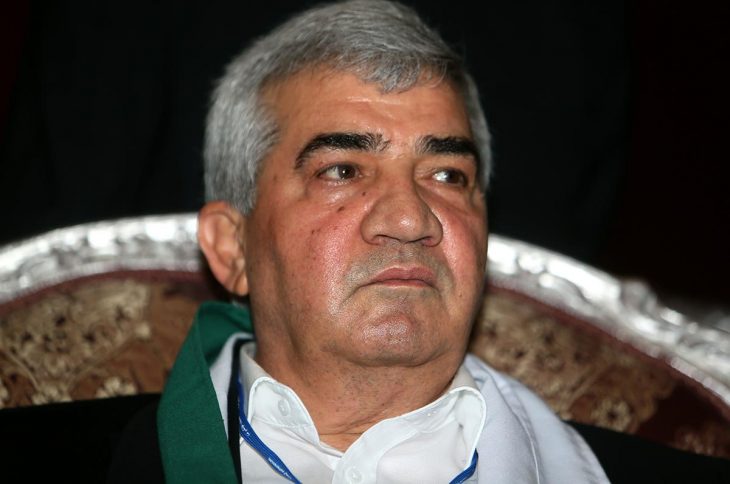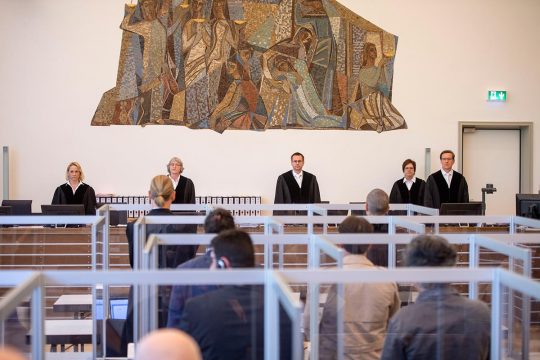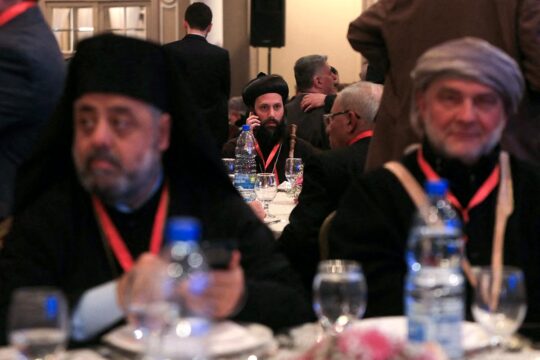Riad Seif’s testimony has been highly anticipated and much discussed. Why did one of Syria’s most famous dissidents help a high-ranking secret service officer of Bashar al-Assad’s regime get asylum in Germany? Did he have evidence in favour of Anwar Raslan, who stands accused of crimes against humanity before a German court in the city of Koblenz? In a statement last May, Raslan had listed Seif as one of the people who could confirm his sympathy with the 2011 revolution and affiliation with the Syrian opposition to Assad. But these expectations were crushed within minutes of Seif’s hearing, when the witness immediately distanced himself from Raslan. Responding to the judge’s usual question, he said: “No, I am not related directly or by marriage to the defendant. I do not know him at all. Before coming to Berlin, I had never seen him in my life.”
This statement came as a surprise since Riad Seif was the one who recommended Raslan to the German foreign office in 2012, helping him and his family secure one of the limited spots in a special humanitarian accommodation program for refugees. What must have seemed like the path to a safe life and better future at the time took an unexpected turn for Raslan when German authorities started investigating him, and finally arrested him in Berlin in 2019. Together with lower-ranking officer Eyad A., he is accused of 58 killings, 4,000 cases of torture as well as rape and sexual assault during his time as head of investigations in Secret Service branch 251, or Al-Khatib branch, in Damascus, Syria’s capital.
A businessman going into politics
On day 26 of the Al-Khatib trial – as the trial of Raslan and his co-accused is also known – Riad Seif appeared before the judges via video link, as his medical condition did not allow him to take the 600-kilometre trip to the courtroom from Berlin. The 73-year-old looked older than his age. He was seated in a wheelchair, hands shaking, pointing out to the judges that he might have to interrupt the hearing suddenly if his condition deteriorated. Seif suffers from cancer, but during the two days of his testimony last week, he seemed revived by memories of his past, which he avidly shared with the judges.
“I was not an ordinary child”, Seif said. The witness got into a detailed narration of his success story, during which he proceeded to put himself on a par with Gandhi and Mandela. He was born to a middle-class family in Damascus in 1946 and started working at a textile company as a teenager. Later, he and his brothers founded their own garment business, which became Syria’s largest company in the 1970s. Although Seif is known today as one of the most famous Syrian dissidents, he came across more as a businessman than a politician.
“In 1994, I joined parliament to apply our business model in all of Syria”, he told the court. “Until then, I had not even read the newspaper or listened to the news. My business was all I cared about.” Seif’s political demands were mostly economical, often directed against the corruption and nepotism of the Assad family. When he criticized the awarding of a mobile telecommunication services monopoly to a company owned by Bashar al-Assad’s cousin Rami Makhlouf, the Ministry of Finance accused him of tax evasion and fined him into bankruptcy. “I lost all my assets to the ruling system,” Seif said.
“If I had known anything negative about him, I would not have supported him”
Seif nevertheless continued his political activity and played an important role in the Damascus Spring that started in 2000, after the death of Hafez al-Assad, Bashar’s father and former president of Syria. Seif hosted regular political debates at his house, eventually forming the Forum for National Dialogue. For this, he was arrested and sentenced to five years in prison in 2001. His second detention lasted from 2008 to 2010. When protesters took to the streets in 2011, Seif joined them but the situation became more and more dangerous for him. After several assaults and gun shots to his bedroom window, he fled Syria. When the judges asked him about the day he left his country, Seif was overwhelmed by grief and struggled with tears. “It was the 13th of June 2012,”he said after a short break. “The United Nations had called me and told me to leave the country immediately.”
Two weeks before Seif went into exile, more than 100 people had been massacred in the region of Houla, northwest of Homs, where Raslan originated from. Among the dead were family members of Raslan’s wife. “Impossible that he could have remained in his position after that”, said Seif, trying to explain Raslan’s decision to give up his responsibilities at Al-Khatib prison, where more and more protesters were piled into cells and allegedly tortured each day. “It seemed to me that his family had pressured him to defect,” said Seif.
By the end of the year, Raslan and his family had left Syria for Jordan, where he joined the Syrian opposition and later managed to contact Riad Seif for help. “My son-in-law told me that there was a defected colonel in Jordan who was being threatened by the Syrian regime and hoped for asylum in Germany,” Seif recalled. Because the request for help came from a very old friend of his son-in-law, he forwarded Raslan’s details to the German foreign office, where Seif was well known and trusted. “If I had known anything negative about him at the time, I would not have supported him,” he stressed.
A letter in praise of Raslan
Riad Seif said he knew Branch 251 well, after having been taken there several times to be interrogated, threatened, and detained for several hours. “There is no secret service branch without torture,” he said to the judges.” But Seif had an incentive to help Raslan, besides doing his son-in-law a favour. “I was told that he was a high-ranking officer in the secret service and most likely had important information,” Seif testified. Even though the sharing of secret information was not a condition for Seif’s help, he assured, he had expected Raslan to cooperate with him “in favour of the revolution.” He was eventually disappointed, he said. After Raslan had arrived in Germany, he, his wife, and children went to visit Seif at their home. “I tried to get information from him, but he did not say a single word,” Seif recalled.
Seif described how he increasingly lost trust in Raslan when more and more victims started to share their stories. This, however, did not prevent him from submitting a letter full of praise for Raslan to the German police, after the latter was arrested. “The days when Colonel Raslan was in charge were comforting for every inmate, and whoever claims otherwise shall be confronted with me,” the statement from a former detainee read. “The days under his authority were like holidays, and we eagerly waited for them to arrive.”
The document had been posted on Facebook, where Seif retrieved it and presented it to the federal police during his interrogation last year. “There are hundreds of statements on social media against Raslan, and just this one in his favour,” he argued agitatedly when Raslan’s defence asked him about the document. “I had nothing to do with Raslan. I just felt responsible as a member of the opposition to be objective and offer a balanced picture to the police.” Clearly, Seif regretted using his position to support a man who is now accused of crimes against humanity. And yet, as a paradox, the trial might have never taken place if his misjudgement had not brought Anwar Raslan to the country that is now prosecuting him.








